Cognitive-Communication Disorders and Speech Therapy
Speak Live Play is a well-regarded service provider in the field of speech and language pathology, offering extensive experience in managing language, cognitive, and swallowing disorders. Our expertise also includes cognitive disorders, a critical but often overlooked area of cognitive-communication disorders. At Speak Live Play, we are dedicated to providing comprehensive care for all aspects of speech and language pathology, ensuring each patient receives the specialized attention they need.
What are Cognitive-Communication Disorders?
Cognitive-communication disorders are communication impediments whose origins can be traced back to underlying defects in a patient’s cognitive processes. These are different compared to those whose causes are primary speech or language deficits, and while many associate them with aging populations, such troubles might be found across all age groups, children included.

These types of disorders present themselves in various ways, with patients manifesting any number of cognitive difficulties in such areas as memory, perception, problem-solving, vocabulary, organization, attention, reasoning, and more. These aspects of cognition are closely linked to a person’s ability to communicate effectively with those around them, which is where speech therapy becomes relevant.
How Cognitive-Communication Disorders Affect Speech and Communication in Patients
The importance of effective communication and proper cognition cannot be underestimated, since they lie at the very heart of our day-to-day life within a society. The specific instances where cognitive-communication disorders may impact a patient are quite simply too numerous to try and list in full, but these are the general signs of such impairments:
- Lack of awareness with regard to any changes or deterioration in terms of the communication effectiveness
- Reduction in the patient’s capacity to effectively recognize, initiate, and communicate their needs to those around them, especially routine scenario that were not an issue before their cognition-impairing circumstance (Alzheimer’s, stroke, brain tumor, traumatic brain injury, dementia, etc.) or decline
- Impaired ability to foresee the consequences of their actions or the risks inherent in certain behaviors, which goes hand-in-hand with reduced judgment and problem solving capabilities
- Increasing difficulties with carrying out daily living operations such as keeping on top of their bills, maintaining their personal hygiene, fulfilling their professional obligations, keeping up with their school work, and more
- Deterioration in their sociability and ability to maintain good relations with those in their social circle, especially those they were relatively close with before. Their increasing inability to express themselves effectively or manage their emotions in a proper manner will eventually lead to the shrinking of their social circle and loss of relationships
- Increase in their injury-proneness comes about as a result of their decreasing ability to communicate with others in case of an emergency or situation where their safety is at risk. This will be exacerbated by a failing capacity to appreciate the dangers inherent in certain situations as well
- Noticeable diminishment of a patient’s ability to effectively communicate or exchange routine information such as their phone number, home address, and such, compounded with memory and judgment impairments
Speech Therapy for Cognitive-Communication Disorders
One of the unfortunate realities associated with cognitive-communication disorders is the fact that too many people believe that nothing can be done to help curtail or reverse their progress. This is especially true in older populations, under the influence of the widely-held belief that the symptoms and effects of Alzheimer’s disease, stroke, brain injury, dementia, and such usually age-related conditions are irreversible.
In truth, speech-language pathology has been shown to be one of the most effective measures a person may undertake in their efforts to combat the onset of these disorders and their adverse effects. Here are a few of the ways in which speech-language pathology can be of assistance to those faced with cognitive-communication impairment:
Cerebrovascular Incidents (Stroke)
It is well known and understood that speech therapy can be highly beneficial in helping those who suffer the post-stroke communication impairments that are so commonly observed in stroke victims. What might not be so clear to many is the benefit that speech-language pathology may bring to the table when it comes to cognition-communication disorders.
The reality of cardiovascular incidents such as strokes is that they will often bring about some element of post-stroke cognitive impairment. A speech-language pathologist will be able to clearly identify the cause of the communication disorder, be it a receptive capability issue, verbal expression difficulties, or a form of cognitive impairment.
Identifying the root cause will be the very step towards formulating a therapy regimen that will hopefully restore or rehabilitate the patient’s communication deficiencies.
Cognitive Decline
Cognitive decline will often be the result of neurological diseases and syndromes such as Alzheimer’s Parkinson’s, and dementia in its various forms. These conditions will often come with a marked decrease in the patient’s quality of life as their mental capacities make it harder for them to accomplish their personal, vocational, and societal functions.
What a speech-language pathologist can help such a patient with is by helping them identify and implement the most effective measures that can be taken to compensate for these shortcomings. The aim will be to help the patients achieve as high a level of independence and normality as their condition will allow, which, in plenty of cases, will often be surprisingly high.
Traumatic Brain Injury
Trauma to the brain through various types of accidents (contact sports, road accidents, falls, fights, etc) may manifest itself in cognitive decline and exhibit much the same symptoms. The severity of such cognition-diminishing incidences will vary depending on the nature of the trauma, but patients, whatever their age, will still benefit from the care of a speech-language pathologist.
In severe cases, a speech therapist may help the patient re-establish some form of meaningful interaction with those around him/her. In less severe instances, where the patient has already implemented compensatory mechanisms for offsetting their cognitive-communicative deficits, the speech-language pathologist will be able to help develop further strategies and techniques that will e the patient more fully realize as high a standard of living as possible.
The Goals of Cognitive-Communication Speech Therapy
The reality of cognitive-communicative disorders is that all cases are more-or-less unique, which is why personalized attention from a speech-language pathologist will be required. This personalized assessment and treatment planning will have the best chances of producing tangible positive results. You may broadly classify the various techniques employed in cognitive-communication speech therapy efforts as follows:
- Remedial
These are certain techniques employed with the goal of restoring the patient to the level of functionality they enjoyed before their cognitive impairment or decline. Some speech pathologists will have patients make use of certain software, apps, exercises, and more to help rebuild attentive capabilities. Spaced retrieval training is a technique employed to help patients solidify and strengthen their memory and recall.
- Compensatory
These techniques are designed to somewhat make up for the patient’s cognitive-communication deficiencies as much as possible, the idea being to offset the negative effects on their lives and those around them. Examples might include the teaching of executive function strategies and problem-solving approaches, such as the plan-do-review system. These techniques tend to focus on the establishment of schedules, routines, and detailed plans, often employing external tools such as smartphones, planners, journals, calendars, etc.
- Educational
These are the techniques that will help not just the patient, but their family and caregivers in ways they can help each other make the situation easier for all involved. This will cover various aspects of the condition, including teaching the signs and symptoms of the condition (what to expect), group therapy and strategizing progress tracking, and general ways that those around a patient can help make a difference.
Why Choose Speak Live Play
Speak live play is an Orange County-based customized evaluation and treatment provider that offers quality and result-oriented care to clients all over the region dealing with speech, cognitive, swallowing and language disorders.
What makes Speak live play is the dedication and personalized care all clients will receive. We understand that all our patients, young and old, deserve to lead a life that is as trouble-free, healthy, and productive as possible, and our goal is to make that a reality. Get in touch with us today.




